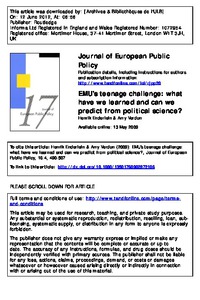EMU's teenage challenge: what have we learned and can we predict from political science?

Enderlein, Henrik ; Verdun, Amy
Journal of European Public Policy
2009
16
4
490-507
economic policy ; EMU ; EU policy ; fiscal policy ; monetary union ; political integration
Financing and monetary policy
http://dx.doi.org/10.1080/13501760902872106
English
Bibliogr.
"We review the initial predictions and claims regarding economic and monetary union (EMU) in Europe against the evidence of its first ten years of existence. We argue that pessimistic views on the creation of EMU have proved to be wrong. Yet EMU's success is rather puzzling, since it is based on a peculiar institutional structure not thought to lead to success. EMU has generated redistributive effects and may have increased business-cycle synchronization. Those effects have not translated into the expected decrease of legitimacy or a widespread democratic deficit of EMU. At the institutional level, EMU has coped well with an asymmetric framework, largely decoupling EMU from political union. There have been neither major spill-over effects pushing for further political integration nor conflict and disintegration. The main question for the future is whether this institutional structure will stay the same in the aftermath of the global financial crisis."
Digital
The ETUI is co-funded by the European Union. Views and opinions expressed are however those of the author(s) only and do not necessarily reflect those of the European Union or the ETUI.